Waters for Wildlife – NCWF’s Chapter Impact and Engagement Around NC Waters and Wetlands
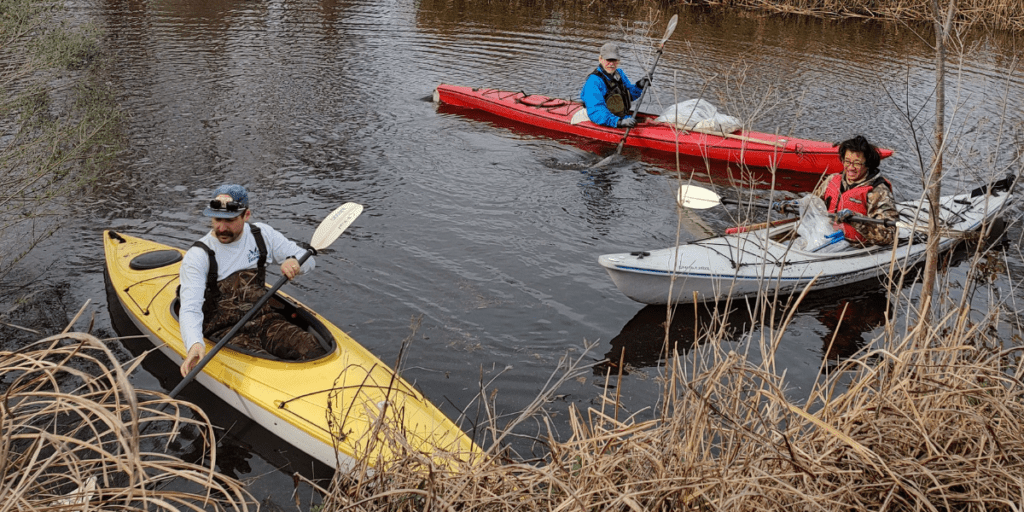
When it comes down to it – we can’t survive without water. This may seem obvious, but the reality of this fact goes beyond what most people think about water. We depend upon it for hydration, sure, but that’s really just the tip of the iceberg.
Waterways purify the natural landscape, removing residues and debris. They help mitigate climate change by storing carbon within their ecosystems. They supply us with seafood and offer numerous recreational opportunities, from fishing and paddling to surfing and swimming. They also provide wildlife with essential hydration, food sources, and habitats that countless species rely on.
In short, water facilitates life.
Unfortunately, the irony of our shared waterways is that they often go unappreciated and are subsequently ignored and even abused. Waterways rich with biotic diversity and natural history require a network of individuals and groups to celebrate and care for them – through advocacy, political action, habitat restoration, increased access, and more.
This is one of the many goals of the North Carolina Wildlife Federation’s (NCWF) habitat restoration efforts. From the mountains to the coast, NCWF works to protect, conserve, and restore North Carolina’s lands and waterways. These efforts ensure that others have the opportunity to experience the beauty of these shared resources and the wildlife that depend upon them. Whether it’s a small stream, a vast river, or a coastal estuary, NCWF’s commitment to restoring and preserving these habitats helps maintain the intricate web of life that thrives in and around our waterways.
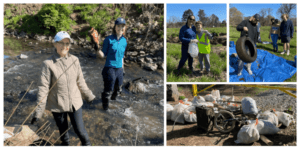
I Spy Trash, March 19. The Charlotte Wildlife Stewards took part in Charlotte Mecklenburg Storm Water Services’ Creek Week. The crew of 28 removed 635 pounds of trash from Briar Creek at Chantilly Ecological Sanctuary. UNC Charlotte student, Sophie Barnett, and her team sorted the trash into plastic, paper, metal, and glass to gather data for her honors research project.
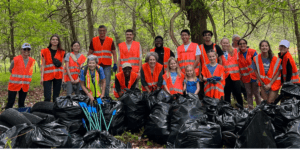
Ellerbe Creek Habitat Restoration Workday, April 15. NCWF partnered with the Friends of the Mountains-to-Sea Trail, environmental students from Duke University and community volunteers for a cleanup along the shores of Ellerbe Creek in Durham. The crew bravely slogged through the mud and removed 1580 pounds of garbage equaling 63 native trees through NCWF’s Clean & Green program.
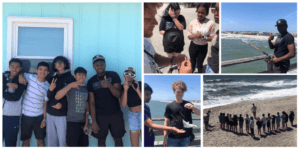
Carolina Ocean Studies Field Trip, May 10. Island Wildlife joined high school students from Wilmington for a field trip with Carolina Ocean Studies. The event was supported by the National Park Foundation’s Junior Ranger Angler Grant program.
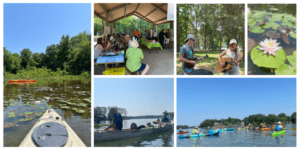
Wild on the Water, June 3. What could be better than a beautiful morning out on the lake?? The Charlotte Wildlife Stewards hosted their signature fundraising event at Mountain Island Lake. Naturalist, Laura Domingo, guided the paddlers around the lake while identifying various plant and animal species. Afterwards, the group enjoyed fellowship with one another while listening to live music and eating fresh sandwiches.
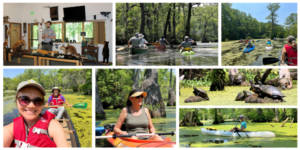
Wildlife Paddle at Merchants Millpond State Park, June 10. NCWF welcomed their newest chapter, Wildlife Habitat Stewards of Northeastern NC, at a fun and wild paddle outing at Merchants Millpond State Park in Gatesville. The outing was led by one of the rangers at the park and participants learned all about the wildlife in the area.
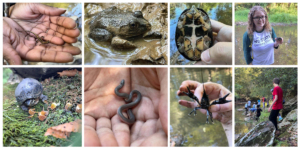
Eno River Herpetology Outing, September 3. The Tri-County Conservationists in partnership with BeWild Reptile Rescue had a herp load of fun along the Eno River! Over 20 enthusiastic participants searched the river and surrounding area for amphibians and reptiles (herps). The group spotted turtles, frogs, snakes, salamanders and more!
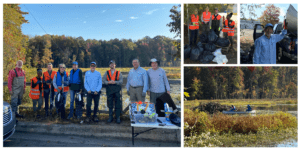
Beaver Marsh Nature Preserve Big Sweep, October 20. NCWF partnered with the Ellerbe Creek Watershed Association for the Durham County Big Sweep. The Big Sweep is an annual event where people can team up with one another to clean up litter in their local communities. Volunteers removed eight bags of trash, two pallets, and a cloth bench from the preserve.
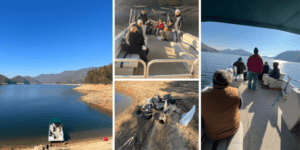
Annual Cleanup at Fontana Dam, November 3 – 5. NCWF partnered with Fontana Village, the National Park Service and many other like minded organizations to participate in the 6th Annual Fontana Lakeshore Trash Cleanup. Over 100 volunteers showed up throughout the weekend and filled 15 thirty yard dumpsters picking up over 75,000 lbs of trash! This year marked the largest turnout and most trash removed so far for this event!
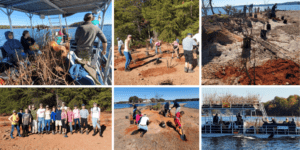
Lake Norman Buttonbush Planting, November 4. NCWF and Lake Norman Wildlife Conservationists teamed up with about 20 volunteers to plant over 100 button bushes on island habitats in Lake Norman. Volunteers loaded plants onto a double decker pontoon boat and unloaded them for planting on three separate islands. These efforts will help stabilize shorelines, reduce erosion, and provide critical habitat for pollinators and other wildlife.
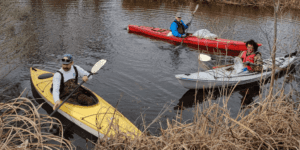
Burnt Mill Creek Cleanup, January 13. Lower Cape Fear Wildlife kicked off 2024 with a cleanup at Burnt Mill Creek in Wilmington. Volunteers removed 100 pounds of trash from the riparian habitat. These cleanup efforts improve habitat conditions for a variety of native wildlife species!
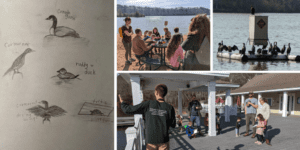
EcoKids Waterfowl Walk & Sketch, February 10. What a great day to stroll along the shore of Bass Lake in Holly Springs and see the variety of waterfowl that call this home during the winter! The South Wake Eco Kids did a walk-and-sketch on a rare near-70-degree day, learning about these birds, observing and sketching Canada geese, cormorants, ruddy ducks, and coots. The group also heard some bald eagles checking out the fish supply in the lake. The highlight of the walk was watching a cormorant capture a catfish and struggle for six or seven minutes, before it could finally figure out how to get it in its mouth!
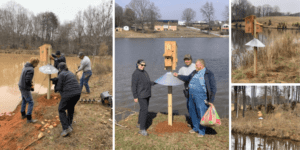
Wood Duck Workday, February 22. Volunteers with the Piedmont Area Wildlife Stewards (PAWS) spent a full day installing wood duck boxes in Cherryville, NC. These wood duck boxes were installed on a working cattle ranch at Cedar Lake farm and will provide critical nesting habitat for wood ducks in Gaston County.
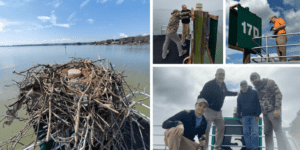
Lake Norman Osprey Habitat Enhancement, March 5. Ospreys typically nest on tall structures that are somewhat isolated and over water. ATONS (Aids to Navigation) are very appealing as nesting sites to the raptors, but such structures pose a hazard to both birds and boaters. LNWC and the Lake Norman Marine Commission took to the water this week to address the issue by installing deterrent devices to prevent ospreys from nesting upon the markers.
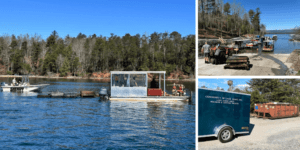
Lake James Annual Cleanup, March 16. The Lake James Area Wildlife and Natures Society completed their annual litter cleanup around Lake James. The weather was perfect for the 130 adults and 78 teenagers that showed up. Volunteers completely filled a 40 foot dumpster and removed several thousand pounds of trash from the lake!
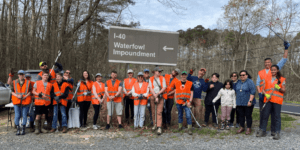
Charlotte Creek Week Cleanup, March 17. The Charlotte Wildlife Stewards once again participated in Char-Mecks annual Creek Week. Volunteers removed trash from a section of Briar Creek at Chantilly Ecological Sanctuary. Briar Creek is an important tributary of the Catawba River Basin providing habitat, recreation, and drinking for our neighbors downstream. This year around 30 volunteers removed over 400lbs of trash from the creek!
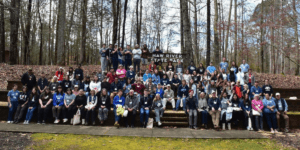
Ocean Advocacy Workshop, March 22 – 23. Over 100 people, including NCWF chapter leaders and college students, were in attendance at the two-day advocacy workshop held in partnership with UNCG Sustainability & Green Fund, NCWF, and the Plastic Ocean Project. Haw River State Park hosted the two-day-long event, where speakers informed attendees about the Rights of Nature bill, plastic impacts in our oceans, and NCWF’s Save Our Sounds campaign and how they could be advocates for our environment and wildlife by leveraging social media. Attendants also took part in a guided nature walk through the state park and smores in the evening!
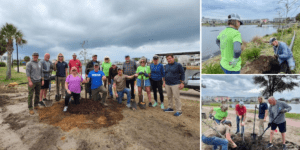
Carolina Lake Planting, March 22. The North Carolina Wildlife Federation alongside Carolina Beach Trash Walkers, Friends of CB Parks & Greenways, CB Beautification Committee, Town Staff and Town Council joined together at Carolina Beach Lake to plant live oaks, bald cypresses and yaupon hollies!
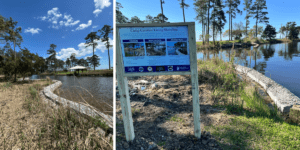
Living Shoreline Installation at Camp Caroline, April 13. NCWF alongside Native Shorelines and the NC Coastal Federation installed a 305 ft living shoreline made of QuickReef units at Camp Caroline in Arapahoe. The newly restored shoreline will provide numerous benefits: reduced erosion, maintained natural marsh, protected coastal habitat, filtered and improved water quality, buffered shore for changing water levels and improved conditions for aquatic plant and animal life. 3,700 salt meadow hay plugs will be installed in May to complete the vegetative buffer behind the shoreline.
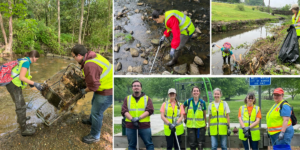
Monroe Litter Sweep, April 20. The Union County Wildlife Chapter partnered with the City of Monroe to pick up litter in and around Bearskin Creek. In a celebration of Earth Day, volunteers removed nearly 200 lbs of trash from local parks and the creek!
Written by:

– Seana Finn, Conservation Coordinator

– Luke Bennett, Conservation Coordinator
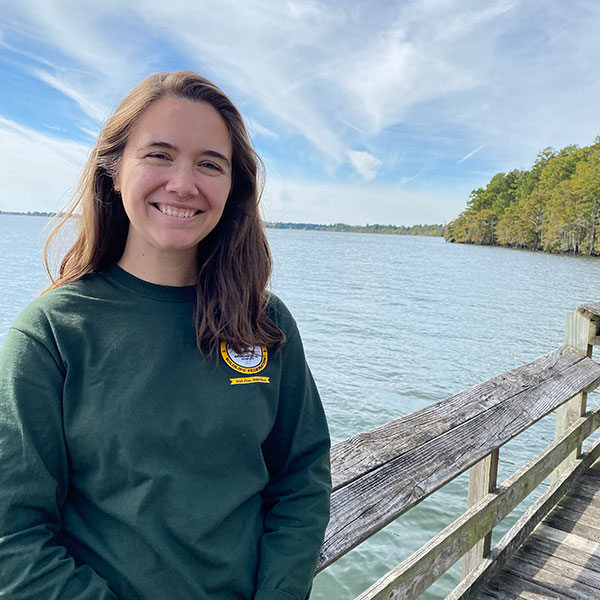
– Laura Frazier, Refuge Conservation Coordinator

– Natalie Bohorquez, VP of Conservation Partnerships
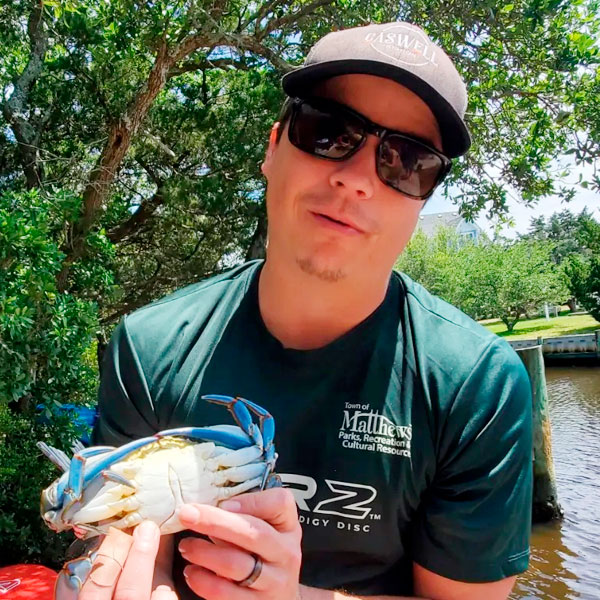
– Alden Picard, Conservation Coordinator

